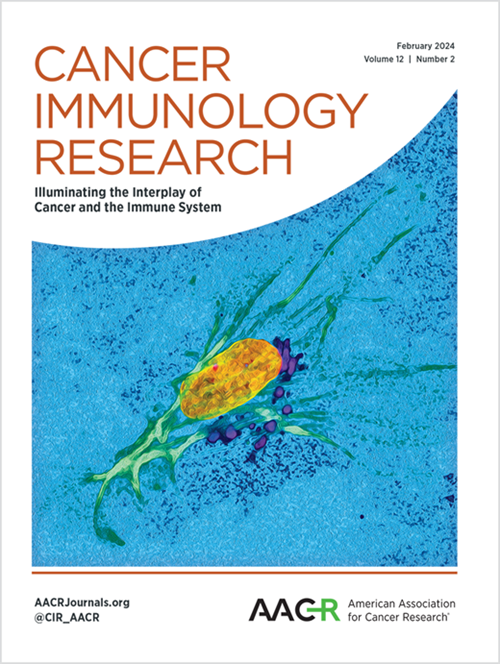Inflammation mediated by gut microbiome alterations promotes lung cancer development and an immunosuppressed tumor microenvironment
IF 8.1
1区 医学
Q1 IMMUNOLOGY
引用次数: 0
Abstract
Accumulating evidence indicates that the gut microbiome influences cancer progression and therapy. We recently showed that progressive changes in gut microbial diversity and composition are closely associated with tobacco-associated lung adenocarcinoma (LUAD) in a human-relevant mouse model. Furthermore, we demonstrated that the loss of the antimicrobial protein Lcn2 in these mice, exacerbates pro-tumor inflammatory phenotypes while further reducing microbial diversity. Yet, how gut microbiome alterations impinge on LUAD development remains poorly understood. Here, we investigated the role of gut microbiome changes in LUAD development using fecal microbiota transfer and delineated a pathway by which gut microbiome alterations incurred by loss of Lcn2 fostered the proliferation of pro-inflammatory bacteria of the genus Alistipes, triggering gut inflammation. This inflammation propagated systemically, exerting immunosuppression within the tumor microenvironment, augmenting tumor growth through an IL-6-dependent mechanism and dampening response to immunotherapy. Corroborating our preclinical findings, we found that patients with LUAD with a higher relative abundance of Alistipes species in the gut showed diminished response to neoadjuvant immunotherapy. These insights reveal the role of microbiome-induced inflammation in LUAD and present new potential targets for interception and therapy.肠道微生物组改变介导的炎症促进了肺癌的发展和免疫抑制的肿瘤微环境
越来越多的证据表明,肠道微生物组会影响癌症的发展和治疗。我们最近在一个与人类相关的小鼠模型中发现,肠道微生物多样性和组成的渐进性变化与烟草相关肺腺癌(LUAD)密切相关。此外,我们还证明,这些小鼠体内抗微生物蛋白 Lcn2 的缺失会加剧促肿瘤炎症表型,同时进一步降低微生物多样性。然而,人们对肠道微生物组的改变如何影响 LUAD 的发展仍然知之甚少。在这里,我们利用粪便微生物群转移研究了肠道微生物群变化在 LUAD 发育中的作用,并确定了一条途径,即 Lcn2 缺失导致的肠道微生物群变化会促进 Alistipes 属促炎细菌的增殖,从而引发肠道炎症。这种炎症向全身扩散,在肿瘤微环境中产生免疫抑制,通过IL-6依赖机制促进肿瘤生长,并抑制对免疫疗法的反应。与临床前研究结果相印证的是,我们发现肠道中Alistipes物种相对丰度较高的LUAD患者对新辅助免疫疗法的反应减弱。这些发现揭示了微生物诱导的炎症在 LUAD 中的作用,并为拦截和治疗提供了新的潜在靶点。
本文章由计算机程序翻译,如有差异,请以英文原文为准。
求助全文
约1分钟内获得全文
求助全文
来源期刊

Cancer immunology research
ONCOLOGY-IMMUNOLOGY
CiteScore
15.60
自引率
1.00%
发文量
260
期刊介绍:
Cancer Immunology Research publishes exceptional original articles showcasing significant breakthroughs across the spectrum of cancer immunology. From fundamental inquiries into host-tumor interactions to developmental therapeutics, early translational studies, and comprehensive analyses of late-stage clinical trials, the journal provides a comprehensive view of the discipline. In addition to original research, the journal features reviews and opinion pieces of broad significance, fostering cross-disciplinary collaboration within the cancer research community. Serving as a premier resource for immunology knowledge in cancer research, the journal drives deeper insights into the host-tumor relationship, potent cancer treatments, and enhanced clinical outcomes.
Key areas of interest include endogenous antitumor immunity, tumor-promoting inflammation, cancer antigens, vaccines, antibodies, cellular therapy, cytokines, immune regulation, immune suppression, immunomodulatory effects of cancer treatment, emerging technologies, and insightful clinical investigations with immunological implications.
 求助内容:
求助内容: 应助结果提醒方式:
应助结果提醒方式:


